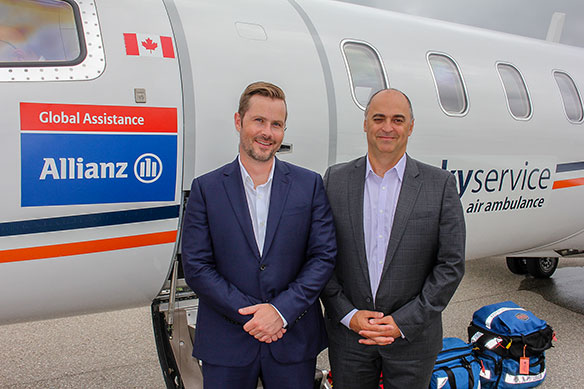
Allianz helping get ailing Canadians home in ‘flying ICU’
GREG COATES
(Photo above: Dan Keon, vice-president, Market Management, Allianz Global Assistance Canada, and Sam Cimone, president, Skyservice Air Ambulance International
It’s a flight you never want to have to take, but one that helps saves lives and one that Allianz Global Assistance Canada and partner Skyservice Air Ambulance International have been offering for more than 30 years.
Canadians are among the best travelled people in the world and on occasion fall ill or are injured while abroad – it can be anything from a car accident to a fall to cardiac arrest. That’s where proper insurance comes in. Many rely on Allianz Global Assistance Canada, a leading provider of travel insurance and assistance, to get them home safely and as quickly as possible.
According to Dan Keon, vice-president, Market Management, Allianz Global Assistance Canada, if a patient’s condition prevents them from being repatriated
on a commercial flight, Allianz calls on partner Skyservice to bring them home in a specially equipped jet that is virtually a flying Intensive Care Unit.
“Wherever you are in the world, when you call us during a medical emergency, the call comes to our centre in Kitchener [Ontario],” said Keon. “Our medical teams assess the situation, monitor the care you are receiving in the local hospital and determine the best course of treatment with your physicians. Once we confirm you are stable to travel and secure a receiving hospital bed in Canada, we work to get you home.”
When commercial air travel is not advisable for a patient, Allianz often calls on Montreal-based Skyservice, one of its preferred medical transportation partners.
“It’s an ICU in the air,” says Sam Cimone, president, Skyservice Air Ambulance International, who is also a trained flight nurse.
The Skyservice aircraft, a specially equipped Bombardier Learjet 45XR, contains a full complement of equipment, including a cardiac monitor, defibrillator, oxygen, ventilator, and laboratory equipment.
The aircraft is staffed with two pilots and up to three medical staff, including a physician, a registered nurse and a respiratory therapist. Using a satellite phone, the inflight crew can consult and stay in constant communication with the Allianz assistance specialists, as well as learn about changes to the patient’s condition while en route. The cabin of the aircraft can accommodate up to two stretchers, plus it has six seats to accommodate medical staff and family members.
Keon told Canadian Travel Press that the intent of travel insurance is to cover the “unexpected,” which can often be medical emergencies.
“You don’t appreciate it, until you need it,” he said.
Keon noted that for the most part travel insurance is very affordable and something travel agents should make sure their clients are aware of.
“They must understand the value of travel insurance. It shouldn’t be an afterthought,” said Keon. “It should be a key part of their booking, just like a hotel room or car rental.”
It is also commissionable.
The majority of repatriation flights are from the Caribbean, but Allianz and Skyservice have brought Canadians home from every continent except Antarctica. If the patient becomes unstable during the flight, the crew finds the nearest airport to land where they can receive care at a qualified hospital.
“Our Kitchener assistance centre, with its staff of over 800, receives approximately two million calls every year from Canadian travellers,” adds Keon. “On average, we enlist our medical transportation partners, including Skyservice, for over 1,400 repatriations each year to ensure our customers will get home to a Canadian hospital as quickly as possible when our medical assessment team determines it is safe for them to travel.”
And service is door-to-door. Upon landing, officials will have an ambulance waiting to transport patients directly to hospital.
(www.allianz-assistance.ca)

